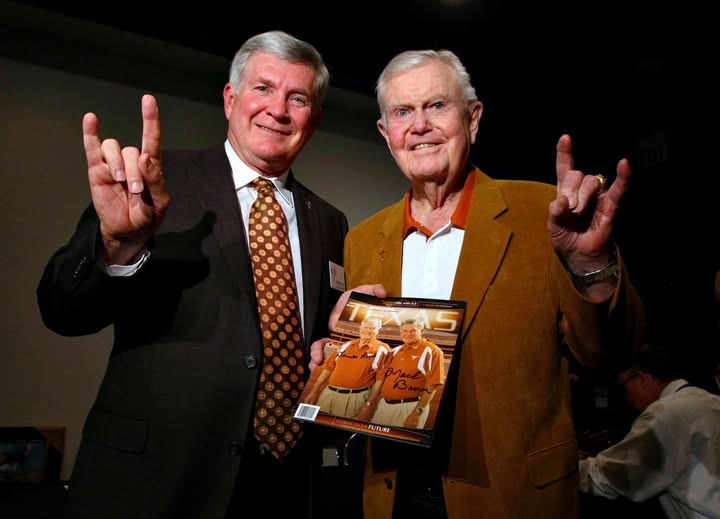Darrell Royal, a name synonymous with tradition, toughness, and excellence, remains one of the most iconic figures in college football history. From 1957 to 1976, Royal served as the head coach of the Texas Longhorns, and in those two decades, he transformed the University of Texas into a powerhouse on the gridiron. More than just a coach, Royal became a cultural figure and a living legend whose influence extended far beyond the football field.
When Royal took the reins in Austin, the Longhorns were in desperate need of stability and leadership. The program had seen modest success, but it lacked a consistent identity. That changed immediately upon Royal’s arrival. He wasn’t just another coach — he was a visionary. In his first season in 1957, he led Texas to a 6-4-1 record, including a berth in the Sugar Bowl, a remarkable turnaround for a team that had gone 1-9 the year before. That quick transformation was the first sign that Darrell Royal was something special. He didn’t wait for things to come together over time — he made them happen right away.
Royal’s coaching philosophy was simple but brutally effective: run the ball, play tough defense, and don’t beat yourself. His approach was famously conservative, even earning him the quote most often associated with his name: “Three things can happen when you throw the ball, and two of them are bad.” He stuck to the ground game with unrelenting commitment and found incredible success doing so. His teams became known for their discipline, grit, and execution. It was old-school football, and it worked.
Perhaps Royal’s most significant innovation was the implementation of the wishbone offense. Installed in 1968 with the help of offensive coordinator Emory Bellard, the wishbone revolutionized college football. Built around the idea of multiple options on every play, it confused defenses and allowed Texas to dominate opponents. The wishbone led to incredible success in the late ’60s and early ’70s, including a 30-game winning streak, three national championships (1963, 1969, and a share in 1970), and multiple Southwest Conference titles. The offense was so effective that other programs soon began to adopt it, forever altering the college football landscape.
Royal’s first national championship came in 1963, a season where Texas went undefeated and capped the year with a 28-6 victory over Navy in the Cotton Bowl. That win didn’t just secure the Longhorns’ place atop the college football world — it validated Royal’s methods and lifted the Texas program to elite status. Six years later, in 1969, the “Game of the Century” against Arkansas became one of the defining moments of Royal’s legacy. The Longhorns trailed 14-0 heading into the fourth quarter before mounting a legendary comeback to win 15-14. The game was watched by President Richard Nixon and millions across the country. With that victory, Texas secured its second national championship, and Royal cemented his place in football lore.
Throughout his career, Royal was revered not only for his coaching acumen but also for his character. He was known as a man of integrity who genuinely cared about his players. He built strong relationships with the young men he coached, treating them with respect and demanding their best in return. He wasn’t flashy or bombastic. He was calm, steady, and wise — a father figure to many and a source of stability for a program that became the envy of the sport.
Royal’s success wasn’t limited to wins and championships. He left a deep cultural imprint on Texas and the broader college football community. His name became a symbol of excellence in coaching. In 1996, the University of Texas honored him by renaming its stadium Darrell K Royal–Texas Memorial Stadium, an enduring tribute to the man who gave so much to the program and its fans. The stadium remains one of the most hallowed grounds in college football, a cathedral to the game and to the coach who built it into what it is today.
The numbers tell part of the story: 167 wins, 47 losses, and 5 ties during his time at Texas. Three national championships. Eleven Southwest Conference titles. A winning percentage of over 77%. But to focus only on the statistics would be to miss what made Royal truly great. He was a coach who understood the responsibility of leadership. He believed in doing things the right way. He never sought the spotlight, preferring to let his teams speak for him through their play on the field. He never chased accolades, but they came to him nonetheless. And even after his retirement in 1976, he remained a deeply respected figure within the university and the state of Texas.
Royal also served as athletic director at Texas from 1962 to 1980, helping to shape not just the football program but the entire athletic department. His influence extended into hiring decisions, facility upgrades, and the overall vision for Texas athletics. He was instrumental in maintaining the program’s high standards and ensuring that his legacy would carry forward for generations.
Even in retirement, Royal stayed connected to the program and the university. He was a beloved figure on campus, and his presence at games and events reminded everyone of the glory years. When he passed away in 2012 at the age of 88, tributes poured in from across the country. Coaches, players, fans, and journalists all shared stories of how Royal had touched their lives. His funeral was held in Austin, with thousands attending to pay their respects to a man who meant so much to the state and the sport.
Royal’s impact went far beyond football. He was an advocate for racial integration in college sports, and his decision to recruit and play African American athletes at Texas helped break down barriers during a turbulent time in American history. In 1970, Royal recruited Julius Whittier, who became the first Black player to letter in football at the University of Texas. It was a courageous move, one that showed Royal’s quiet commitment to progress and equality. He wasn’t outspoken about his actions — he just did what he thought was right.
Coaching, at its core, is about building something that lasts. Wins fade, trophies collect dust, but the culture a coach builds can endure. Darrell Royal built a culture of excellence, humility, and hard work at Texas. His players didn’t just leave with championship rings; they left with life lessons that shaped who they became as men. Many former players went on to successful careers, citing Royal as a major influence in their lives. His legacy isn’t just measured in banners or bowl wins but in the generations of people he inspired.
In an era where college football has become increasingly commercialized and coaches are often judged solely by their win-loss records, Royal’s legacy is a reminder that greatness is about more than numbers. It’s about values. It’s about leadership. It’s about leaving a place better than you found it. Darrell Royal did all of that and more.
To this day, Texas fans still speak his name with reverence. The Longhorn tradition — the burnt orange, the Hook ‘em Horns, the pride of Saturday afternoons in Austin — owes much of its power to Royal’s work. He laid the foundation for what Texas football has become and established a standard that still looms large over the program. Coaches who have followed in his footsteps are judged against the towering bar he set, and few have measured up.
Darrell Royal didn’t just coach football. He shaped a generation. He gave Texas its football identity. He proved that discipline and heart could win championships. He brought honor to the game and to the university. He showed what it meant to lead with dignity, to innovate with courage, and to win with class.
Today, as crowds pour into the stadium that bears his name, his legacy lives on. The echoes of his victories still ring through the stands, and his spirit continues to guide the Longhorns every time they take the field. Darrell Royal may be gone, but he will never be forgotten. He is, and always will be, a giant in the annals of college football history.



